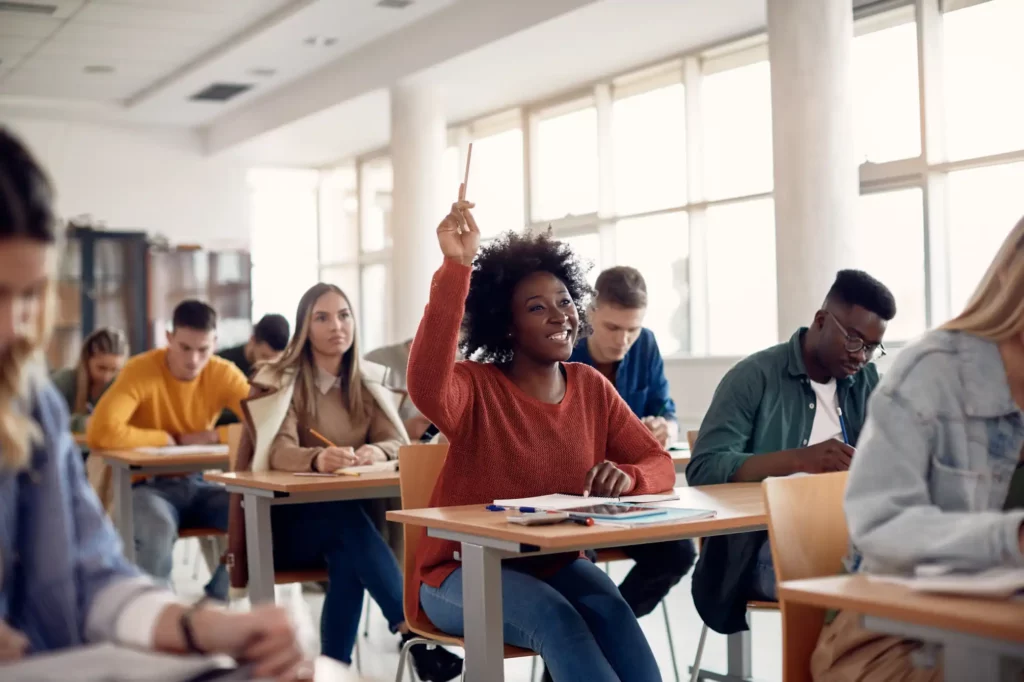
Higher education expands beyond academic learning, providing students with an immersive environment that fosters personal growth and cultivates cultural awareness. While pursuing knowledge and acquiring skills are integral to college education, the transformative effects go far beyond the classroom. This blog explores how college experiences shape students' perspectives, expand their horizons, and instill a deep understanding and appreciation for diverse cultures.
In the multifaceted journey of college life, students encounter various opportunities that contribute to their personal growth and cultural awareness. From exposure to diversity in their classrooms to engaging in cultural courses, study abroad programs, and extracurricular activities, each experience plays a vital role in shaping their holistic and inclusive education. As students navigate the path of higher education, they may also seek suitable accommodations for their college stay. Websites like myamericanave.com provide a platform where students can explore a range of apartment options to create a living space that reflects their individuality. By integrating these elements into their college experience, students can truly appreciate the lifelong benefits of personal development, enhance their interactions with others, and become well-prepared for a globalized world.

The Diverse College Environment
College campuses are teeming with a diverse student population, allowing students to interact with and learn from individuals with different backgrounds and perspectives. In the United States, for instance, a 2021 report by the National Center for Education Statistics shows that more than 74% of enrollments in degree-granting postsecondary institutions were made up of students of color, highlighting the extent of the diversity in colleges and universities.
Being in such an environment promotes a better understanding of different cultures and helps reduce prejudice. Interacting with diverse individuals exposes students to different perspectives and traditions that may be new to them. Sharing traditions, festivals, and viewpoints provides a platform for learning and appreciating diversity in all its forms. For instance, a student from a homogenous background who might have misconceptions about other cultures can correct these misconceptions through interactions with people from different cultural backgrounds than their own.
Moreover, living and working with individuals from diverse backgrounds allows for the formation of genuine relationships based on mutual respect and understanding, leading to a more inclusive and tolerant community. Such an environment encourages collaboration and teamwork and expands students' horizons, preparing them to live and work in multicultural settings. Therefore, a diverse college environment is key to cultivating cultural awareness and appreciation among college students.
Exposure To Different Worldviews
One of the significant ways in which college cultivates cultural awareness and personal growth is through exposure to different worldviews. This exposure comes in various forms, including specialized courses emphasizing cultural studies, history, and global issues. These courses allow students to delve deep into different cultures, understand their histories, and explore global challenges. By studying the richness and diversity of various societies, students gain a broader understanding of the world and develop a more inclusive mindset.
In addition to specialized courses, colleges often invite guest speakers from diverse backgrounds to deliver lectures, participate in seminars, and share their experiences with the student body. These speakers may come from different countries, professional fields, or cultural identities, offering unique perspectives and insights. Listening to these speakers allows students to broaden their horizons, challenge their preconceptions, and gain a deeper appreciation for the range of human experiences.
Furthermore, college exposes students to different teaching philosophies and pedagogies. Professors with diverse backgrounds and expertise bring their unique teaching styles into the classroom, encouraging students to engage with different approaches to learning. This exposure to diverse teaching methodologies enhances students' adaptability and critical thinking skills. It fosters an appreciation for different ways of acquiring knowledge. By experiencing various teaching philosophies, students develop a flexible mindset and become more open to different perspectives, preparing them to thrive in an increasingly interconnected world.
Opportunities For Study Abroad And Exchange Programs
One of the college's most transformative experiences is the opportunity to participate in study abroad and exchange programs. These programs allow students to immerse themselves in a different culture and gain first-hand experience of living and studying in a foreign country. The benefits of such immersive experiences are numerous and contribute significantly to students' cultural awareness and personal growth.
Immersing oneself in a different culture through study abroad programs allows students to break out of their comfort zones and enter an unfamiliar environment. This exposure to new traditions, languages, and social dynamics broadens their perspectives and challenges their preconceived notions. By living and interacting with locals, students understand the host country's culture, customs, and way of life. They develop empathy, adaptability, and problem-solving skills while navigating new situations and engaging with people from diverse backgrounds.
Moreover, study abroad programs challenge biases and assumptions that students may hold. Students are exposed to different societal norms, political systems, and educational practices that may contrast with what they are familiar with. This exposure encourages them to critically examine their beliefs and values, fostering a more inclusive and open-minded approach to understanding different cultures. Students develop a deeper sense of cultural awareness, empathy, and respect for diversity by grappling with cultural differences and confronting stereotypes.

Extracurricular Activities And Clubs
Extracurricular activities and clubs play a significant role in college in cultivating cultural awareness and personal growth among students. These activities provide a platform for students to engage with diverse cultures, collaborate in diverse teams, and develop crucial leadership and teamwork skills.
Cultural clubs, organizations, and societies are integral in promoting cultural awareness and appreciation on campus. These clubs provide a safe space for students of different cultural backgrounds to come together, share their experiences, and celebrate their heritage. Through these clubs, students can delve deeper into their culture and learn about others as they engage in conversations, organize events, and showcase their traditions. The existence of diverse cultural clubs fosters a sense of belonging. It encourages students to embrace their identities while appreciating and engaging with the identities of others.
Events such as international food festivals or multicultural performances are organized by these clubs and contribute to the promotion of cultural sharing on campus. International food festivals allow students to taste and experience diverse flavors and culinary traditions worldwide. These events provide delicious food and serve as a gateway to understanding different cultural practices and customs surrounding food. Multicultural performances, on the other hand, showcase various forms of artistic expression and talent from different cultural backgrounds. Students gain exposure to various art, music, dance, and traditions by watching these performances, further enriching their cultural knowledge and appreciation.
Participating in extracurricular activities and clubs allows students to collaborate, lead, and work in diverse teams. While engaging in these activities, students often work with individuals from different cultural backgrounds, perspectives, and experiences. This diversity fosters collaboration, as students must navigate and embrace different ideas and approaches. Being part of a diverse team also hones leadership skills, as students learn to navigate cultural differences, mediate conflicts, and inspire their teammates to work towards a common goal. These experiences in collaborative and diverse teams prepare students for the multicultural and global workforce they will encounter after college.
Personal Growth Through Challenges And Adaptability
In a college environment that actively promotes cultural awareness, students are often faced with diverse and unfamiliar situations. These challenges present opportunities for personal growth and development. By navigating through such difficulties, students learn to adapt and become more resilient, evolving their values and beliefs in response to cultural diversity.
Interacting with people from different cultures may not always be comfortable or easy. Students may face language barriers, socio-cultural norms, and communication style differences are common challenges. However, students develop crucial interpersonal skills such as empathy, patience, and active listening by challenging themselves and adapting to new situations. These skills are invaluable in the pursuit of cultural competence and personal growth. By grappling with unfamiliar situations, students become more flexible and tolerant, honing their soft skills equally vital to their academic learning.
Adapting to new and unfamiliar situations is integral to personal growth at the college level. The experience of being away from home, immersed in a new setting, and learning to function independently can be daunting. However, it is by taking on such challenges that students can build resilience, adaptability and learn to cope with uncertainty. Through these experiences, students develop a sense of self-reliance, self-efficacy, and confidence.
College also provides a platform for students to question their values and beliefs, which can lead to personal growth. Exposure to diverse cultures and beliefs often results in a shift in perspective that opens up new ways of thinking. It challenges students to re-evaluate their beliefs and question what they take for granted. Understanding alternative perspectives and adapting one's values and beliefs in response to diverse interactions is essential for personal growth and development.
Advantages Of Cultural Awareness In The Professional World
Cultural awareness and sensitivity are indispensable for professionals in today's globalized workplace. College is crucial in preparing students for diverse work environments by providing them with the knowledge and skills necessary to navigate cultural nuances. Understanding and catering to a global clientele is a significant advantage that stems from cultivating cultural awareness during college.
Cultural sensitivity is of utmost importance in the globalized workplace. As businesses expand across borders and networks, become increasingly interconnected, professionals are required to interact with individuals from different cultural backgrounds. By being aware of cultural nuances such as communication styles, customs, and social norms, professionals can avoid misunderstandings, foster positive relationships, and build trust with colleagues and clients worldwide. Cultural sensitivity also allows for effective collaboration and teamwork in multicultural settings. Understanding and valuing diverse perspectives contributes to enhanced workplace problem-solving, creativity, and innovation.
College acts as a stepping stone in preparing students for the demands of diverse work environments. Exposure to a diverse student body, cultural organizations, internships, and multicultural events on campus helps students develop the necessary skills to navigate different cultures. College courses emphasizing cultural studies, international relations, and cross-cultural communication provide students with a theoretical foundation and practical insights into working across cultural boundaries. By engaging in discussions, group projects, and presentations with peers from diverse backgrounds, students learn to appreciate and navigate cultural differences, fostering a deeper understanding of the importance of cultural awareness personally and professionally.
Understanding and catering to a global clientele gives professionals a competitive advantage in today's interconnected world. With the rise of international markets and the ease of conducting business online, companies are increasingly seeking employees who can understand and cater to customers' unique needs and preferences from different cultural backgrounds. Culturally aware professionals can tailor their products, services, and marketing strategies to resonate with diverse audiences, leading to increased customer satisfaction and business success. The ability to adapt to different cultural contexts also opens up opportunities for global assignments and positions, allowing professionals to broaden their horizons and pursue international career paths.

Reflective Spaces In College
College provides students with various reflective spaces and resources for cultivating cultural awareness and personal growth. Through counseling, mentorship, and peer discussions, students are encouraged to engage in introspection, evaluate their beliefs, biases, and assumptions, and ultimately experience growth through self-awareness and reflection.
College counseling services provide a safe and supportive environment for students to explore their thoughts, feelings, and experiences. Qualified counselors help facilitate self-reflection by encouraging students to examine their beliefs, values, and biases. These sessions provide an opportunity for students to gain a better understanding of themselves and their cultural identities, leading to increased self-awareness and personal growth. Counseling can also help students navigate challenges related to cultural adjustment, discrimination, and identity exploration, enabling them to develop resilience and coping strategies.
Mentorship programs are another valuable resource in colleges that contribute to cultivating cultural awareness and personal growth. Mentors, often faculty members or upperclassmen, provide students with guidance, support, and encouragement. By engaging in regular conversations with their mentors, students can reflect on their experiences, seek advice, and gain insights from someone with more knowledge and experience. Mentorship fosters introspection and prompts students to question their beliefs, assumptions, and biases, enabling them to develop a broader perspective and a deeper understanding of diverse cultures and perspectives.
Peer discussions and dialogue are essential components of reflective spaces in college. Through organized discussions, student-led clubs, or informal conversations with classmates, students can exchange ideas, challenge assumptions, and broaden their perspectives. Peer discussions allow students to explore different viewpoints, question their beliefs and biases, and develop greater cultural awareness. By actively participating in such dialogues, students can gain a deeper understanding of the experiences and perspectives of others, fostering empathy and intercultural competence.
Growth through self-awareness and reflection is a transformative process that prepares students for personal and professional success beyond college. By encouraging students to critically evaluate their beliefs, biases, and assumptions, colleges help cultivate a mindset of continuous learning and growth. Through self-reflection, students become more open-minded, adaptable, and self-aware, enabling them to navigate complex cultural landscapes with sensitivity and respect. This enhanced self-awareness deepens their understanding of diverse cultures. It equips them with the skills to navigate interpersonal relationships and approach future challenges with an open mind.

Conclusion
College serves as a transformative period in which students have the opportunity to cultivate cultural awareness and experience personal growth. Through various enriching experiences, such as exposure to diverse communities, engaging coursework, and reflective spaces, students develop a deeper understanding of different cultures and gain valuable insights into their identities. These experiences shape their perspectives and foster empathy and equip them with essential skills for success in their personal and professional lives. The ability to navigate multicultural environments, communicate effectively across cultural boundaries, and appreciate diverse perspectives becomes a distinct advantage in today's globalized world. As students embark on their college journey, they need to seize the myriad opportunities and embrace the potential for growth that college offers. By actively participating in cultural activities, engaging in coursework that promotes cultural understanding, and seeking reflective spaces like counseling and mentorship, students can truly thrive in pursuing cultural awareness and personal growth during their college years and beyond.

